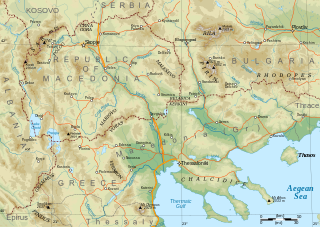
Macedonia is a geographical and historical region of the Balkan Peninsula in Southeast Europe. Its boundaries have changed considerably over time; however, it came to be defined as the modern geographical region by the mid-19th century. Today the region is considered to include parts of six Balkan countries: all of North Macedonia, large parts of Greece and Bulgaria, and smaller parts of Albania, Serbia, and Kosovo. It covers approximately 67,000 square kilometres (25,869 sq mi) and has a population of around five million. Greek Macedonia comprises about half of Macedonia's area and population.

Pan-Slavism, a movement which crystallized in the mid-19th century, is the political ideology concerned with the advancement of integrity and unity for the Slavic people. Its main impact occurred in the Balkans, where non-Slavic empires had ruled the South Slavs for centuries. These were mainly the Byzantine Empire, Austria-Hungary, the Ottoman Empire, and Venice.

Cyril and Methodius (815–885) were brothers, Byzantine Christian theologians and missionaries. For their work evangelizing the Slavs, they are known as the "Apostles to the Slavs".
The Slavs or Slavic peoples are a grouping of related ethnic groups which speak the various Slavic languages, belonging to the larger Balto-Slavic branch of the Indo-European language family. Slavs are geographically distributed throughout the northern parts of Eurasia; they predominantly inhabit Central Europe, Eastern Europe, and Southeastern Europe, though there is a large Slavic minority scattered across the Baltics, Northern Asia, and Central Asia. Continued immigration has resulted in the development of a substantial Slavic diaspora in the Americas.

The Severians, also Severyans, Siverians, or Siverianians were a tribe or tribal confederation of early East Slavs occupying areas to the east of the middle Dnieper River and southeast of the Danube River. They are mentioned by the Bavarian Geographer, Emperor Constantine VII (956–959), the Khazar ruler Joseph, and in the Primary Chronicle (1113).
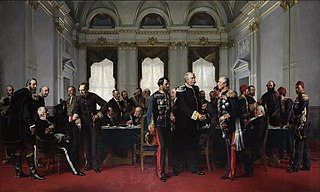
The Congress of Berlin was a diplomatic conference to reorganise the states in the Balkan Peninsula after the Russo-Turkish War of 1877–78, which had been won by Russia against the Ottoman Empire. Represented at the meeting were Europe's then six great powers: Russia, Great Britain, France, Austria-Hungary, Italy, and Germany; the Ottomans; and four Balkan states: Greece, Serbia, Romania and Montenegro. The congress concluded with the signing of the Treaty of Berlin, replacing the preliminary Treaty of San Stefano that had been signed three months earlier.
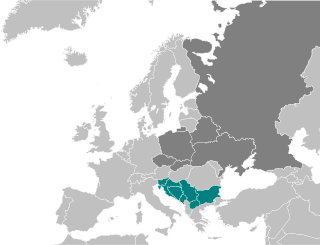
South Slavs are Slavic people who speak South Slavic languages and inhabit a contiguous region of Southeast Europe comprising the eastern Alps and the Balkan Peninsula. Geographically separated from the West Slavs and East Slavs by Austria, Hungary, Romania, and the Black Sea, the South Slavs today include Bosniaks, Bulgarians, Croats, Macedonians, Montenegrins, Serbs and Slovenes.

Aleksander Brückner was a Polish scholar of Slavic languages and literature (Slavistics), philologist, lexicographer, and historian of literature. He is among the most notable Slavicists of the late 19th and early 20th centuries, and the first to prepare complete monographs on the history of the Polish language and culture. He published more than 1,500 titles and discovered the oldest extant prose text in Polish.

Mavro Orbini (1563–1614) was a Ragusan chronicler, notable for his work The Realm of the Slavs (1601) which influenced Slavic ideology and historiography in the later centuries.
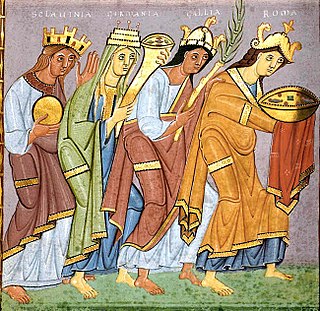
The Sclaveni or Sklabenoi were early Slavic tribes that raided, invaded and settled in the Balkans in the Early Middle Ages and eventually became the progenitors of modern South Slavs. They were mentioned by early Byzantine chroniclers as barbarians having appeared at the Byzantine borders along with the Antes, another Slavic group. The Sclaveni were differentiated from the Antes and Wends ; however, they were described as kin. Eventually, most South Slavic tribes accepted Byzantine or Frankish suzerainty, and came under their cultural influences and Chalcedonian Christianity. The term was widely used as a general catch-all term until the emergence of separate tribal names by the 10th century.

Renato Poggioli, was an Italian academic specializing in comparative literature. After 1938, he lived in the United States. At the time of his death, he was the Curt Hugo Reisinger Professor of Slavic and Comparative Literature at Harvard University. A prolific writer and translator, who was fluent in five languages, he is considered one of the founders of the academic discipline of comparative literature in the United States.
As the 9th-century missionaries Saints Cyril and Methodius undertook their mission to evangelize to the Slavs of Great Moravia, two writing systems were developed: Glagolitic and Cyrillic. Both scripts were based on the Greek alphabet and share commonalities, but the exact nature of relationship between the Glagolitic alphabet and the Early Cyrillic alphabet, their order of development, and influence on each other has been a matter of great study, controversy, and dispute in Slavic studies.

In the 9th century, Christianity was spreading throughout Europe, being promoted especially in the Carolingian Empire, its eastern neighbours, Scandinavia, and northern Spain. In 800, Charlemagne was crowned as Holy Roman Emperor, which continued the Photian schism.

Christianity in the Middle Ages covers the history of Christianity from the fall of the Western Roman Empire. The end of the period is variously defined. Depending on the context, events such as the conquest of Constantinople by the Ottoman Empire in 1453, Christopher Columbus's first voyage to the Americas in 1492, or the Protestant Reformation in 1517 are sometimes used.
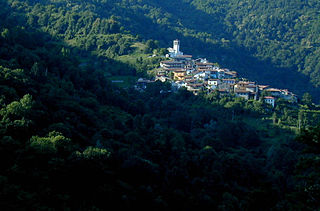
Slavia Friulana, which means Friulian Slavia, is a small mountainous region in northeastern Italy and it is so called because of its Slavic population which settled here in the 8th century AD. The territory is located in the Italian region of Friuli Venezia Giulia, between the town of Cividale del Friuli and the Slovenian border.
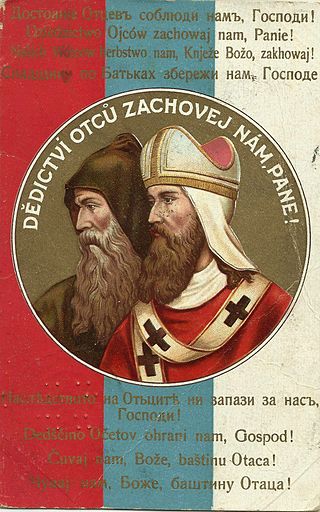
The Slavs were Christianized in waves from the 7th to 12th century, though the process of replacing old Slavic religious practices began as early as the 6th century. Generally speaking, the monarchs of the South Slavs adopted Christianity in the 9th century, the East Slavs in the 10th, and the West Slavs between the 9th and 12th century. Saints Cyril and Methodius are attributed as "Apostles to the Slavs", having introduced the Byzantine-Slavic rite and Glagolitic alphabet, the oldest known Slavic alphabet and basis for the Early Cyrillic alphabet.

Dejan Ajdačić, is a Serbian Slavist, philologist, folklorist, ethnolinguist, literary critic, translator and editor.

In Slavic Christianity, the trilingual heresy or Pilatian heresy is the idea that Biblical Hebrew, Greek, and Latin are the only valid liturgical languages or languages in which one may praise God. Trilingualism was rejected in the 850s by Saints Cyril and Methodius, Byzantine brothers and missionaries who introduced a Christian liturgy in the vernacular of their Slavic converts, a language now called Old Church Slavonic.

Angelo Maria Ripellino was an Italian translator, poet, linguist and academic.

Ettore Lo Gatto was an Italian linguist, literary historian, translator, critic and academic.
















